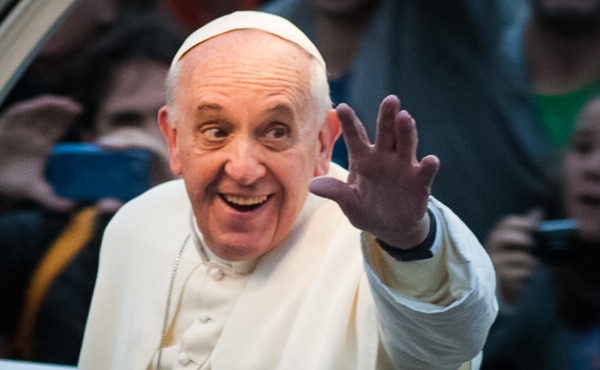A New Pope - A New Hope? Pope Francis Sends Mixed Messages On Abortion, Contraception & Homosexuality
By Victoria Pavlova in Lifestyle / Showbiz on 20 September 2013
But are Pope Francis' convictions all that different to his predecessors?
The Pope and by association the Catholic church seemed to be moving in a different direction from the more doctrine-minded rule of his predecessor. Well, any hopes more liberally-minded Catholics had held were all but smashed this week, when Pope Francis announced his stance on abortion in particular. The pope denounced abortions as a symbol of today’s “throw-away culture” and urged Catholic doctors to refuse to perform them. He cited Vatican teaching on the need to defend the unborn during an audience with Catholic gynecologists. "
Every child that isn't born, but is unjustly condemned to be aborted, has the face of Jesus Christ, has the face of the Lord," he said via the Associated Press and continued: "Things have a price and can be for sale, but people have a dignity that is priceless and worth far more than things."

Is the Pope extending a gesture of peace? To whom?
This comes as a slight contradiction to blasting the church's obsession with "small-minded rules" that are driving the faithful away and urging it focus instead on being merciful and welcoming. This interview naturally sent waves of discontent throughout the church, so perhaps his abortion statement was meant to appease more conservative followers of Christ. To some, however, it sounds dangerously close to statements made by his predecessor, most notably his infamous comment that condom use might actually serve to increase the spread of AIDS in Africa.
Regardless of his latest divisive statement, however, Pope Francis remains the most liberally minded Catholic leader of the past several decades. His remarks that he doesn’t judge gay people and that he would be happy to baptize an “illegitimate” child have quickly made him a people’s favorite. Nevertheless, in an effort to make peace with the past, Greg Burke, the Vatican's senior communications adviser, insisted Friday that Francis was by no means calling into question the papacies and priorities of his predecessors.
"The pope is not condemning his predecessors," Burke told The Associated Press. "What he is saying is 'We've spent a lot of time talking about the boundaries, we've spent a lot of time talking about what is sin and what's not. Now let's move on. Let's talk about mercy. Let's talk about love.'"
Contactmusic
Suggested

Leisure Festival - Dreamland in Margate
On the same day that Glastonbury welcomed back Margate's adopted sons, The Libertines, Margate itself put on it's very own Leisure Festival as it...

Pretty Fierce talk to us about collaborating with Doja Cat, emetophobia, arena tours and staying "true to yourself" [EXCLUSIVE]
Sheffield's very own all girl group Pretty Fierce are still on a high after the recent release of their debut single - 'Ready For Me'.

Will Varley & Jack Valero - The Astor Theatre Deal Live Review
Three nights before the end of his current tour Will Varley returned to his home town of Deal to delight a sold out crowd in The Astor Theatre.

WYSE talks to us about her "form of synaesthesia", collaborating with Radiohead's Thom York and the prospect of touring with a band [EXCLUSIVE]
With only a few days to go before Portsmouth based songstress and producer WYSE releases her new single, 'Belladonna', we caught up with her to find...
Advertisement

Bay Bryan talks to us about being a "wee queer ginger", singing with Laura Marling and being inspired by Matilda [EXCLUSIVE]
Colorado raised, Glasgow educated and Manchester based Bay Bryan is nothing if not a multi-talented, multi-faceted artist performing as both...

Keelan X talks to us about staying true to "your creative vision", collaborating with Giorgio Moroder and being "a yoga nut" [EXCLUSIVE]
Former Marigolds band member Keelan Cunningham has rediscovered his love of music with his new solo project Keelan X.
![Luke De-Sciscio talks to us about having the courage to be yourself, forgiving that which is outside of one's control and following whims [EXCLUSIVE] Luke De-Sciscio talks to us about having the courage to be yourself, forgiving that which is outside of one's control and following whims [EXCLUSIVE]](https://images.contactmusic.com/images/home/homepage/luke-de-sciscio-abof-a.jpg)
Luke De-Sciscio talks to us about having the courage to be yourself, forgiving that which is outside of one's control and following whims [EXCLUSIVE]
Wiltshire singer-songwriter Luke De Sciscio, formally known as Folk Boy, is set to release is latest album - 'The Banquet' via AntiFragile Music on...

Annie Elise talks to us about the challenges a female producer has to face and "going through a year of grief and sickness" [EXCLUSIVE]
Electronic music pioneer and producer Annie Elise says that the release of her first EP - 'Breathe In, Breathe Out' feels "both vulnerable and...
Advertisement
